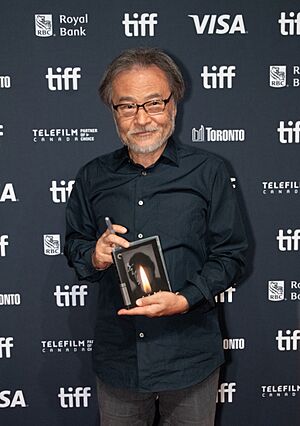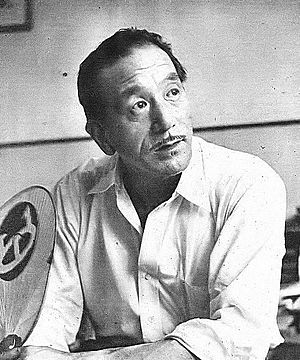Kiyoshi Kurosawa facts for kids
Quick facts for kids
Kiyoshi Kurosawa
|
|
|---|---|

Kurosawa at the 2024 Toronto International Film Festival
|
|
| Born | July 19, 1955 Kobe, Japan
|
| Alma mater | Rikkyo University |
| Occupation | Film director, screenwriter, film critic, actor |
| Years active | 1973–present |
Kiyoshi Kurosawa (黒沢 清, Kurosawa Kiyoshi, born July 19, 1955) is a famous Japanese film director. He also writes movie scripts, acts, and used to teach at Tokyo University of the Arts.
He is well-known for his psychological films. These movies often explore what characters are thinking and feeling deep inside. He is especially famous for his scary movies, known as Japanese horror, like his highly praised film Cure from 1997. Kurosawa has also made films in many other styles. Most of his movies are in Japanese, but he has made two films in French: Daguerrotype (2016) and Serpent's Path (2024).
Contents
Early Life and Education
Kiyoshi Kurosawa was born in Kobe, Japan, on July 19, 1955. He started making short films about his own life when he was in high school.
He later studied at Rikkyo University in Tokyo. There, he learned from a well-known film expert named Shigehiko Hasumi. During this time, Kurosawa began making films using 8mm cameras.
It's important to know that Kiyoshi Kurosawa is not related to the famous director Akira Kurosawa.
Kurosawa's Film Career
Kurosawa began directing movies professionally in the 1980s. He started with low-budget films and direct-to-video productions. In 1981, his 8mm film Shigarami Gakuen was nominated for an award at the Pia Film Festival.
His first full-length movie was released in 1983. He became more widely known after directing The Excitement of the Do-Re-Mi-Fa Girl (1985) and The Guard from Underground (1992).
In the early 1990s, Kurosawa won a special scholarship. This allowed him to study filmmaking in the United States. This was a great opportunity, even though he had already been directing for almost ten years.
International Recognition
Kurosawa first became famous around the world with his 1997 crime thriller, Cure. A year later, he made two more thrillers, Serpent's Path and Eyes of the Spider. Both films featured the same lead actor, Show Aikawa, and explored similar themes of revenge.
In 1999, the Hong Kong International Film Festival showed a special collection of five of his films. This included The Excitement of the Do-re-mi fa Girls, The Guard from Underground, Serpent's Path, Eyes of the Spider, and License to Live.
Kurosawa continued his success with Charisma in 1999. This detective film starred Kōji Yakusho. In 2000, his film Seance premiered on TV. It was based on a novel and also starred Kōji Yakusho.
In 2001, he directed the horror film Pulse. Kurosawa then released Bright Future in 2003, featuring actors like Tadanobu Asano and Joe Odagiri. Later that same year, he made another digital film called Doppelganger. Both Bright Future and Doppelganger were nominated at the Cannes Film Festival.
Later Works and Awards
In 2005, Kurosawa directed Loft, which was a love story. The next year, he made another horror film, Retribution. With his 2008 film, Tokyo Sonata, Kurosawa moved away from horror. This movie was a family drama.
He has also written a book based on his film Pulse. He co-wrote a book about the history of horror movies.
In 2012, Kurosawa directed a five-part TV drama called Penance. His film Real, starring Takeru Sato and Haruka Ayase, was released in 2013. He won the Best Director award at the 8th Rome Film Festival for Seventh Code later that year.
His 2015 film Journey to the Shore was shown at the 2015 Cannes Film Festival. There, he won the prize for Best Director. In 2016, his thriller Creepy premiered at the 66th Berlin International Film Festival. This film was his first horror movie in ten years.
His 2017 film Before We Vanish was also shown at the Cannes Film Festival. In 2019, his film To the Ends of the Earth was the closing film at the 72nd Locarno Film Festival.
In 2020, Kurosawa won the Silver Lion for Best Direction at the 77th Venice International Film Festival for his film Wife of a Spy.
Directing Style and Influences
Kurosawa's directing style has been compared to famous directors like Stanley Kubrick. However, he has said that Alfred Hitchcock and Yasujirō Ozu helped shape his ideas about filmmaking. He also admires American directors such as Don Siegel and Sam Peckinpah.
Kurosawa often works with the actor Kōji Yakusho. He explained that they share similar ideas and feelings. He enjoys working with him because they are from the same generation.
Kurosawa's films often show decaying buildings and places that look abandoned. This can make viewers think about environmental issues.
He believes a director's style should not be too fixed. Kurosawa admires filmmakers who can do many different things. He always wants to try something new and different. He has seen many great films from around the world. These movies inspire him to make films that people will remember for a long time.
Kurosawa credits film critic Hasumi Shigehiko as a mentor. Hasumi taught him that filmmaking is worth dedicating your whole life to. Both Kurosawa and Hasumi believe that every part of a film is important and should be carefully planned. Kurosawa wants to share Hasumi's teachings through his own films.
Filmography
Feature Films
- The Excitement of the Do-Re-Mi-Fa Girl (1985)
- Sweet Home (1989)
- The Guard from Underground (1992)
- Cure (1997)
- License to Live (1998)
- Charisma (1999)
- Barren Illusion (1999)
- Pulse (2001)
- Bright Future (2003)
- Doppelganger (2003)
- Kazuo Umezu's Horror Theater: House of Bugs (2005)
- Loft (2005)
- Retribution (2006)
- Tokyo Sonata (2008)
- Real (2013)
- Seventh Code (2013)
- 1905 (cancelled)
- Journey to the Shore (2015)
- Creepy (2016)
- Daguerrotype (2016)
- Before We Vanish (2017)
- Foreboding (2017)
- To the Ends of the Earth (2019)
- Wife of a Spy: Theatrical Edition (2020)
- Chime (2024)
- Serpent's Path (2024)
- Cloud (2024)
Short Films
- Vertigo College (1980)
- Ghost Cop (2003)
- Beautiful New Bay Area Project (2013)
Direct-to-Video Films
- Yakuza Taxi (1994)
- Men of Rage (1994)
- Suit Yourself or Shoot Yourself: The Heist (1995)
- Suit Yourself or Shoot Yourself: The Escape (1995)
- Door 3 (1996)
- Suit Yourself or Shoot Yourself: The Loot (1996)
- Suit Yourself or Shoot Yourself: The Gamble (1996)
- Suit Yourself or Shoot Yourself: The Nouveau Riche (1996)
- Suit Yourself or Shoot Yourself: The Hero (1996)
- The Revenge: A Visit from Fate (1997)
- The Revenge: A Scar That Never Fades (1997)
- Eyes of the Spider (1998)
- Serpent's Path (1998)
DVD Releases
- Soul Dancing (2004)
Television Work
- Wordholic Prisoner (1990)
- Whirlpool of Joy (1992)
- Seance (2000)
- Matasaburo, the Wind Imp (2003)
- Penance (2012)
- Foreboding (2017)
- Wife of a Spy (2020)
- Modern Love Tokyo (2022, episode 5)
Acting Roles
- The Funeral (1984) – Assistant director
- The Legend of the Stardust Brothers (1985) – Customer
- The Enchantment (1989) – Librarian
- Stranger at Night (1991) – Taxi rider
- Reincarnation (2005) – College professor
- Occult (2009) – Himself
Music Videos
- Marquees – Tongati Musume (1991)
- Sōtaisei Riron – Flashback (2016)
- Nogizaka46 – Actually... (2022)
Achievements and Awards
- Awards
| Award | Year | Category | Film | Result | Ref |
|---|---|---|---|---|---|
| 54th Cannes Film Festival | 2001 | Prize of Un Certain Regard | Pulse | Nominated | |
| 56th Cannes Film Festivals | 2003 | Competition | Bright Future | Nominated | |
| 61st Cannes Film Festivals | 2008 | Prize of Un Certain Regard | Tokyo Sonata | Won Prix du Jury | |
| 68th Cannes Film Festivals | 2015 | Prize of Un Certain Regard | Journey to the Shore | Won Best Director | |
| 70th Cannes Film Festivals | 2017 | Prize of Un Certain Regard | Before We Vanish | Nominated | |
| 41st Japan Academy Film Prize | 2018 | Best Director | Before We Vanish | Nominated | |
| 77th Venice International Film Festival | 2020 | Best Director Silver Lion | Wife of a Spy | Won | |
| 29th Busan International Film Festival | 2024 | Best Director Silver Lion | The Asian Filmmaker of the Year | Won |
- Honors
| Honor | Year | Ref |
|---|---|---|
| Medal with Purple Ribbon | 2021 |
See also
 In Spanish: Kiyoshi Kurosawa para niños
In Spanish: Kiyoshi Kurosawa para niños
 | Selma Burke |
 | Pauline Powell Burns |
 | Frederick J. Brown |
 | Robert Blackburn |


